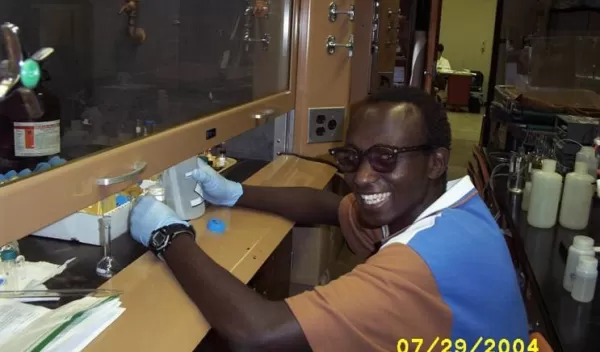
RISE Program Proves that Undergraduate Research Experiences Help Recruit Minority Scientists
As the first member of her family to finish high school, Robyn Hannigan didn't expect to stay in school--much less science lab--forever. But now a professor of geochemistry at Arkansas State University, she is poised to do just that. And she's inspiring a growing number of minority students to follow her lead.
With funding from the National Science Foundation's Research Experiences for Undergraduates (REU) program, Hannigan designed a program to fund minority students to conduct undergraduate research, with the ultimate goal of increasing diversity in the scientific workforce. The program--Research Internships in Science of the Environment, or RISE--gives some students their first experience doing research. More than 30 undergraduates have received funding for summer research projects through RISE since the program was started in 2001.
Hannigan knows from experience that many students don't see the appeal of science until they have a chance to conduct research of their own. Raised in a cross-cultural environment by a Native American mother and Irish immigrant father, Hannigan grew up in a small Rhode Island town bordering the Narragansett Reservation. She was an average student, at best, spending time before and after school pulling lobster pots and catching clams. When a graduate student from a nearby university recruited children from Hannigan's elementary school to help collect samples for a water quality research project, Hannigan volunteered. The course of her life, she says, was forever altered. The graduate student's enthusiasm for science proved contagious, and the hands-on experience gave Hannigan an early look at what life as a scientist could be like.
"I remember [the graduate student's name] was Susan, but beyond that I don't know anything about her. But if she hadn't opened up her project to include elementary students, I'm not sure I would've gone into science," she notes.
Hannigan went on to study biology as an undergraduate at New Jersey's Trenton State College and, under the tutelage of an encouraging advisor, embarked on a project studying eye development in tadpoles. She discovered an affinity--and a talent--for research.
"I was required to do research, and when I got into it, I realized I was a much sharper cookie than I ever gave myself credit for," she remembers.
There was an element of teamwork in research, too, that she had not experienced in her classes. When she came down with the chickenpox, a group of friends--who were conducting research projects of their own--went to the lab and took instructions from Hannigan over the phone on how to keep the experiments running while she was out sick.
"The combination of a hands-on research experience, teamwork and the encouragement of my advisor built my confidence overnight," Hannigan says.
After college, she took a job as a field chemist, but her college advisor stayed in touch and encouraged her to go to graduate school. "He kept hammering away," she recalls.
The persistence paid off. Hannigan went to the University of Rochester, earning a doctorate in geochemistry in 1997. Now, when she reflects on the role mentorship played in her decision to pursue a research career, she says she feels compelled to carry on the tradition.
That's exactly what she and some of her Arkansas State colleagues are doing through the RISE program. RISE faculty recruit minority and female undergraduates for research projects in the environmental sciences, a thriving field of study in Arkansas. The state is a major agricultural producer, and more than half of it is covered by forest land, including three national forests. RISE participants work across disciplines to focus on the relationships between agricultural land use and ecological health.
The RISE program, Hannigan reports, has been a rousing success.
One group of students investigated whether pesticide use was causing defects in birds and found no correlation. Another group looked at the toxicity of caffeine to microorganisms that live in the streams where the compound invariably ends up. Others discovered a variety of the metal tin--a carcinogen called butyl tin--in pockets of soil where it was not known to exist.
In combination with their fieldwork, RISE students also collect data from laboratory work. In doing so, they are exposed to cutting-edge analytical instruments for the analysis of water and gas samples--Hannigan's own area of expertise.
Her research entails designing analytical tools for identifying or detecting tiny chemical samples. "It's instant gratification," she says of her line of work. "You put a sample in one end and get an answer, immediately, out of the other."
But the value of programs like RISE goes beyond research results: Sometimes they make a tangible mark on the science workforce.
So far, Hannigan reports, more than 90 percent of graduates from the RISE program have gone on to pursue a doctorate. And for her, that reward is as sweet as any scientific gain: "Nothing's better than getting a Christmas card and hearing how much the program, and the mentorship that's built into it, meant to [a former RISE student]," Hannigan says.
The National Science Foundation's REU program fosters undergraduate research, supporting students who join ongoing research programs and research projects designed especially for undergraduates.
"You can't understate the impact of a program like REU," Hannigan says. Or, for that matter, RISE.
--Sarah Goforth
